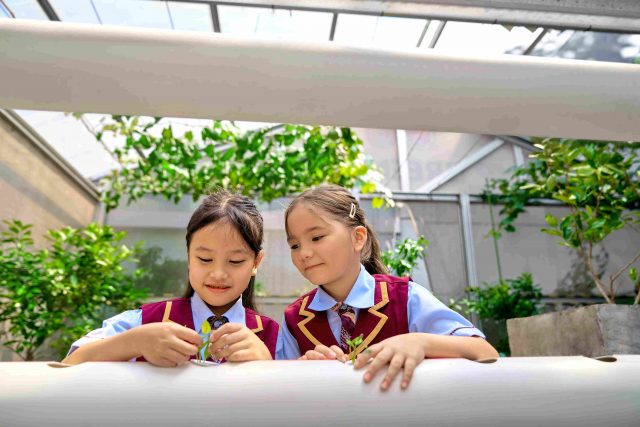The IB Primary Years Programme (PYP) Curriculum Framework

The IB Primary Years Programme Curriculum Framework at BINUS SCHOOL Simprug is a comprehensive educational approach designed for children aged 3–12. This internationally recognised IB curriculum in South Jakarta is characterised by its transdisciplinary, inquiry-based, and student-centred nature, with a focus on fostering responsible action.
At its core, the Primary Years Programme (PYP) aims to break traditional subject boundaries, allowing students to explore and learn between, across, and beyond disciplines. Explore more about its framework here in this article. If you’re looking for an IB school in South Jakarta that nurtures holistic development through the Primary Years Programme, BINUS SCHOOL Simprug offers an enriching learning journey tailored to young learners.
Transdisciplinary Themes
In the IB Primary Years Programme Curriculum Framework, the transdisciplinary themes serve as the foundation for inquiry-based exploration, connecting various subject areas and real-world issues.
By integrating knowledge and skills across disciplines, these themes encourage students to develop a deeper understanding of global significance. Six transdisciplinary themes guide learning within the PYP curriculum framework:
- Who we are.
- Where we are in place and time.
- How we express ourselves.
- How the world works.
- How we organise ourselves.
- Sharing the planet.
Concepts
Furthermore, there are several key concepts within the IB Primary Years Programme Curriculum Framework.
Firstly, the curriculum is transdisciplinary, meaning it surpasses conventional subject boundaries. This method prompts students to establish links across diverse areas of knowledge, nurturing a comprehensive grasp of concepts.
Secondly, inquiry-based learning is fundamental to the PYP curriculum. Through inquiry, students explore their interests and questions, driving their learning process.
They engage in activities such as wondering, experimenting, researching, and problem-solving to deepen their understanding. This approach not only develops cognitive skills but also nurtures curiosity and critical thinking.
Another important concept in the PYP curriculum is student agency. Students are viewed as active participants in their learning journey.
They take ownership of their learning, develop self-efficacy, and collaborate with others to achieve common goals. This empowers them to become responsible, internationally-minded individuals.
Lastly, the concept of the IB Primary Years Programme Curriculum Framework emphasises the importance of action.
Students are encouraged to apply their learning to real-life situations and take meaningful action in their communities. This fosters a sense of social responsibility and prepares students to contribute positively to society.
Approaches to Learning (ATL)
In the IB PYP, the Approaches to Learning (ATL) play a crucial role in shaping students’ educational journey. These ATL skills are grounded in the belief that learning how to learn is essential for students both in and out of the classroom, including:
- Thinking skills
- Communication skills
- Research skills
- Self-management skills
- Social skills
PYP teachers collaboratively plan for implicit and explicit opportunities to develop these ATL skills both inside and outside the program of inquiry.
By integrating ATL into their teaching practices, educators empower students to become lifelong learners capable of navigating complex challenges with confidence and resilience.
Learner Profile
The learner profile represents a comprehensive set of attributes, dispositions, and traits that encompass various aspects of intellectual, personal, emotional, and social growth.
Throughout the PYP, the IB Learner Profile will influence every aspect of school life. All members of the learning community, including students, educators, parents, and school leaders, are tasked with embracing and showcasing these attributes.
As guided by the IB Primary Years Programme Curriculum Framework, an IB education prioritises several key aspects, including:
- Student-centred programs foster healthy relationships, ethical responsibility, and personal growth.
- Effective teaching and learning methods equip students with the knowledge, attitudes, and skills necessary for both academic and personal success.
- Understanding diverse languages, cultures, and global issues to foster a broad worldview.
- A comprehensive, balanced, and interconnected curriculum to ensure students engage with significant content in a meaningful way.
Inquiry-Based Learning
Basically, inquiry-based learning is a student-centred approach that encourages children to explore, question, and investigate. Instead of simply memorising facts, students are empowered to think critically and creatively.
This method of learning is not just about finding answers. It’s about asking the right questions. Students are encouraged to wonder, experiment, and seek information. Through inquiry, they develop important skills such as problem-solving, research, and communication.
So, overall, inquiry-based learning is a dynamic process. It will engage students in meaningful activities that spark their curiosity and drive their learning forward
Whether they’re conducting experiments, collecting data, or testing theories, students are actively involved in constructing their understanding of the world. At BINUS SCHOOL Simprug, our teachers guide students through rich inquiry cycles that spark curiosity and build foundational skills for lifelong learning.
Also Read: IB Diploma Programme: Benefits & The Subjects
Action
In the IB Primary Years Programme Curriculum Framework, action plays a central role in fostering student agency and international-mindedness. It involves students taking meaningful steps to apply what they’ve learned to real-world situations.
This could be through individual or collective action, where students identify issues or opportunities for improvement within their communities and take proactive steps to address them.
Assessment
Picture for thumbnail (DSC5432 Adjusted HIRES) > rec file name (Students-Nurturing-Growth-Not-Just-Grading)
Alt img: PYP Assessment Focuses on Growth, Not Just Grades
The last component within the IP PYP curriculum framework is the assessment. Unlike traditional measurement or assessment methods, IB offers a holistic approach that values student growth and development.
From formative assessments that inform teaching and learning to summative evaluations that capture student achievement, there are various assessments in the PYP.
So, overall, the IB Primary Years Programme Curriculum Framework offers a transformative educational experience for students. You can get the best IB curriculum experience with us at BINUS SCHOOL Simprug.
Reference:
https://www.ibo.org/programmes/primary-years-programme/curriculum/
https://www.ibo.org/programmes/primary-years-programme/
https://www.acs-schools.com/ib-primary-years-programme-ibpyp
https://www.ibo.org/programmes/primary-years-programme/curriculum/learning-and-teaching/
https://www.ibo.org/globalassets/new-structure/brochures-and-infographics/pdfs/pyp-programme-brochure-en.pdf
https://www.ibo.org/programmes/primary-years-programme/how-the-pyp-works/


